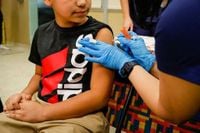Florida is on the brink of a dramatic shift in public health policy, as Surgeon General Joseph Ladapo announced plans to end all state-mandated vaccines, including those required for schoolchildren. The move, which would make Florida the first state in the nation to scrap immunization requirements for students, has ignited fierce debate across the state and the country. The announcement, made during a CNN interview on September 7, 2025, has drawn both sharp criticism and fervent support, reflecting deep divisions over the role of government in personal and public health decisions.
During his appearance on CNN’s "State of the Union," Ladapo was pressed by anchor Jake Tapper about the reasoning behind the decision. Tapper asked whether the state used any scientific analysis or data to justify ending vaccine mandates. Ladapo’s response was blunt and unequivocal: “Absolutely not,” he said. He elaborated, “There’s this conflation of the science and, sort of, what is the right and wrong thing to do.” According to Florida Politics, Ladapo specifically cited the whooping cough vaccine as an example, claiming, “That’s an example of a vaccine that is ineffective. The data show that it is ineffective at preventing transmission, so mandates with that really don’t have anything to do with the notion of transmission.”
Florida currently requires pre-K through 12th-grade students to be immunized against diseases such as polio, measles-mumps-rubella, chickenpox, and hepatitis B. For decades, these requirements have been a cornerstone of public health policy, credited with keeping dangerous outbreaks at bay in schools and communities. Yet Ladapo described these mandates as policies that “drip with disdain and slavery,” arguing that they infringe upon parental rights and bodily autonomy. “The state has no right to tell parents what they should put in a body, which is a gift from God,” he stated during the interview, as reported by Florida Politics.
The ethical dimension of the debate was front and center in Ladapo’s remarks. He framed the issue as one of “individual sovereignty,” asserting that the government should not make medical decisions for families. “This is an issue, very clearly, of parents’ rights. So, do I need to analyze whether it’s appropriate for parents to be able to decide what’s appropriate to go into their child’s bodies? I don’t need to do an analysis on that,” Ladapo told Tapper. When pressed on whether any analysis or projections had been done regarding the potential health impacts of lifting vaccine mandates in public schools—a step no other state has taken—Ladapo replied, “We don’t need to do any projections. We handle outbreaks all the time. So there’s nothing special that we would need to do.” This statement, as reported by Bloomberg, underscores the administration’s confidence in its ability to manage potential consequences without additional study.
Governor Ron DeSantis has been a driving force behind the push to eliminate vaccine mandates, a move that aligns with his broader efforts to position Florida as a state of individual freedoms and limited government intervention. According to Bloomberg, DeSantis is aiming to make Florida the first state to eliminate these requirements, further distinguishing his administration’s approach from the rest of the nation.
Not everyone in Florida is on board with this bold new direction. A Washington Post-KFF poll cited during the CNN interview found that 82% of Florida parents support vaccine mandates in public schools. Tapper expressed surprise at Ladapo’s admission that no health impact projections had been conducted, remarking, “I’m kind of shocked.” But Ladapo was unmoved by public opinion data, stating, “My history, if you will, is I share what I believe is the right thing to do, whether it is popular or not,” referencing his earlier opposition to COVID-19 lockdowns and vaccines for children.
The announcement has sparked intense discussion among medical professionals and lawmakers alike. On September 7, 2025, CBS News Miami’s "Facing South Florida" dedicated an episode to exploring the political and medical fallout from the decision. The program featured Dr. Scott Rivkees, former Florida Surgeon General, and State Senator Tina Polsky, who represents Broward and Palm Beach counties. Both guests offered critical perspectives on the policy shift, highlighting concerns about potential increases in vaccine-preventable diseases and the broader implications for public health.
Dr. Rivkees, drawing on his experience as a former top health official, emphasized the importance of vaccination in preventing outbreaks of diseases that once posed dire threats to children. State Senator Polsky warned that eliminating vaccine mandates could put vulnerable populations at risk, especially those who cannot be vaccinated for medical reasons and rely on herd immunity for protection.
The debate over vaccine mandates in Florida is not occurring in a vacuum. The state has previously been at the center of national controversies surrounding COVID-19 policies, with both Ladapo and DeSantis taking high-profile stances against federal guidance and public health consensus. Ladapo reiterated his opposition to COVID-19 lockdowns and vaccines for children during his recent CNN appearance, underscoring his broader skepticism toward government-mandated health interventions.
Supporters of the move argue that it is a necessary correction to what they see as government overreach. They contend that parents, not bureaucrats, should have the final say in their children’s medical care. Critics, however, warn that the decision could have far-reaching consequences, potentially reversing decades of progress in controlling infectious diseases. The lack of scientific analysis or health impact projections has been a particular point of contention, with public health advocates arguing that such an unprecedented policy shift should be guided by rigorous evidence rather than ideology alone.
The controversy has also reignited broader debates about the balance between individual rights and collective responsibility. While Ladapo and DeSantis frame the issue as a matter of personal freedom, opponents caution that public health is inherently communal. “Vaccination is not just about protecting your own child,” Dr. Rivkees noted on CBS News Miami. “It’s about protecting all children, especially those who are most vulnerable.”
As Florida moves forward with plans to end vaccine mandates, the rest of the country is watching closely. Will this experiment in deregulation lead to a resurgence of preventable diseases, or will it become a new model for parental rights in public health? For now, the only certainty is that the debate is far from over, and the stakes could hardly be higher for families across the Sunshine State.


